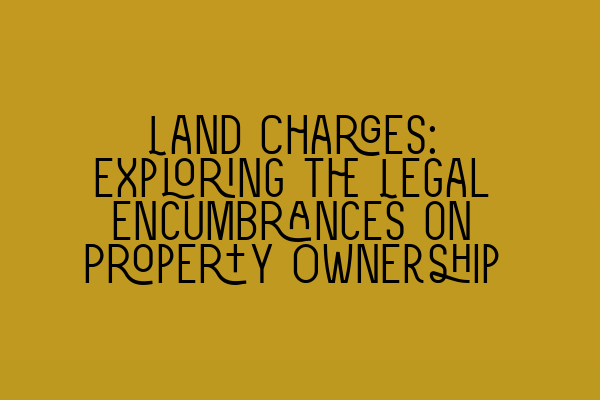Land Charges: Exploring the Legal Encumbrances on Property Ownership
When it comes to property ownership, there are various legal encumbrances that can affect the rights and interests of owners. These encumbrances, known as land charges, are important to understand as they can have significant implications for both buyers and sellers.
In this article, we will dive into the world of land charges, exploring what they are, how they are registered, and the impact they can have on property transactions. We will also discuss some key examples of land charges and their relevance in property law.
What Are Land Charges?
Land charges are legal interests or rights that exist over a particular property. They are registered against the property itself, rather than the owner. This means that even if the property changes hands, the land charge remains in place, and subsequent buyers will be subject to it.
Land charges provide notice to the general public of certain interests or rights that affect a property. This ensures transparency and allows potential buyers to make informed decisions when purchasing property.
Registration of Land Charges
Land charges are typically registered with the Land Charges Department of Her Majesty’s Land Registry. The registration process involves submitting the necessary documents and fee to officially record the land charge against the property.
Once registered, land charges are publicly accessible through an official search of the Land Charges Register. This allows anyone with an interest in a property to investigate any existing land charges that may affect its ownership.
Types of Land Charges
There are several types of land charges that can be registered against a property. Some common examples include:
1. Restrictive Covenants:
Restrictive covenants are conditions or limitations placed on the use of a property. They are typically included in the deeds or contracts of a property and aim to preserve the value or character of the land. Examples of restrictive covenants may include restrictions on building extensions or limitations on certain activities within the property.
To learn more about the legal dimensions of contracts, check out our article on Ethics in Contract Law: Navigating the Moral and Legal Dimensions.
2. Equitable Interests:
Equitable interests refer to interests in property that are recognized by equity rather than common law. These interests may arise through trusts, such as when a property owner holds a property in trust for another person or entity.
3. Charging Orders:
A charging order is a type of land charge that allows an unpaid creditor to secure the debt against a property owned by the debtor. This ensures that the creditor has the right to seek payment from the proceeds if the property is sold.
4. Easements:
Easements are rights granted to someone that allow them to use a portion of another person’s land for a specific purpose. Common examples include rights of way or rights to access utilities such as water or electricity.
If you are interested in learning more about deceptive practices in contracts, read our article on Misrepresentation in Contracts: Unveiling Deceptive Practices.
Impact of Land Charges on Property Transactions
When buying or selling a property, land charges play a crucial role in the transaction. As a buyer, it is important to conduct diligent searches to identify any existing land charges that may affect the property’s ownership or use. This allows you to make an informed decision about whether to proceed with the purchase.
For sellers, it is essential to disclose any relevant land charges to potential buyers. Failure to disclose these encumbrances can result in legal consequences, including claims of misrepresentation or breach of contract.
By understanding the impact of land charges, both buyers and sellers can navigate property transactions more effectively, ensuring transparency and protecting their interests.
If you are preparing for the SQE Contract Law exam, be sure to explore our article on A Closer Look at SQE Contract Law Syllabus for a comprehensive overview of the key topics and concepts to study.
The Significance of Land Charges in Property Law
Understanding land charges is essential for property owners, buyers, and legal professionals alike. Land charges provide vital information about the ownership and use of a property, ensuring transparency and protecting the rights of all parties involved.
By analyzing landmark cases and influential judgments, legal professionals can further deepen their knowledge of land charges. To explore some of these cases, check out our article on SQE Contract Law: Analyzing Landmark Cases and Influential Judicial Decisions.
Whether you are buying, selling, or advising on property transactions, a thorough understanding of land charges is crucial. By considering the key considerations and best practices, as outlined in our article on Contract Law for Services: Key Considerations and Best Practices, you can navigate the complexities of land charges effectively.
In conclusion, land charges are an integral part of property ownership and transactions. By understanding the various types of land charges, their registration process, and their impact on property transactions, individuals can make informed decisions and protect their interests. Whether you are a property owner, buyer, or legal professional, knowledge of land charges is essential in navigating the complex world of property law.
